by Julie McConnell | Jul 22, 2024
Authored by Ethan Carter & Julie McConnell
Florida Statute Chapter 482 Changes
July 1, 2024, marked the implementation of new Florida Statutes affecting pesticide applicators in the landscape industry. The full Florida Department of Agriculture and Consumer Services (FDACS) memorandum can be accessed here https://ccmedia.fdacs.gov/content/download/116156/file/482_memo_24.pdf
Below is a recap of major changes affecting pesticide applicators in the structural/landscape categories (please see memo above for all F.S. Chapter 482 changes):
- Pest Control Operators – renewal date will be based on 1-year anniversary of issue date rather than date set by FDACS
- Pest Control, Special ID Card for Fumigation, Limited Commercial Landscape Maintenance, Limited Lawn & Ornamental, Limited Structural, and Limited Wildlife
- licenses and certificates issued after July 1, 2024, will require reexamination to recertify IF not renewed by CEUs within 60 days of expiration date
- false statements on applications, cheating on exams, or violated exam procedures are subject to disciplinary actions
- Limited Commercial Landscape Maintenance
- 6-CEU pre-requisite for certification is eliminated
- Products with no signal word can be used in addition to “caution” products with the caveat that “warning” or “danger” are not designated signal words on the product
- Driveways, sidewalks, and patios added to plant bed application sites
- Spray tank size removed (formerly 3-5 gal) but still excludes the use of power equipped sprayers and limited to portable handheld or backpack sprayers
Changes to Testing Sites
UF/IFAS Extension has historically been the primary pesticide exam administer on behalf of the Florida Department of Agriculture and Consumer Services (FDACS), but that contract will be ending soon. There will be a three-phase transition from UF/IFAS offering exams to FDACS assuming these tasks over the next 18 months.
Phase I
Through December 30, 2024, paper (scantron) or online exams on designated pesticide exam laptops can be given by an approved exam administrator at a UF/IFAS Extension Office or Research & Education Center. Exams will be available as part of educational workshops, scheduled group exams, or by appointment.
EverBlue online exam proctoring will continue to be available for applicators who wish to take exams on their own equipment at their convenience for an additional fee. This service has been in place for several years and is still an option.
Phase II
As of December 31,2024 paper exams administered by UF/IFAS will no longer be an available option at County Extension Offices.
All exams will be administered electronically through the following two platforms from January 1, 2025, through September 30, 2025:
1) Designated pesticide laptops at select UF/IFAS Extension Offices by appointment only. Not all Extension Offices have this equipment available, so you must check with your local office and find out their testing schedule and capacity.
2) Testing with your own equipment using the private EverBlue platform (additional fees required).
Phase III
In October 2025, the UF/IFAS Extension pesticide testing computers will no longer be compatible with pesticide exam software. This option will be eliminated and applicators will need to schedule exams with private exam proctoring companies designated by FDACS.
FDACS is currently soliciting bids from professional testing services to provide both remote proctored exams (those you take at home) and physical test centers distributed throughout the state. The timing, availability, and provider of these services are to be determined by FDACS and their contractual team. As more information becomes available it will be shared.
In order to help stakeholders with this transition, the UF/IFAS Extension Panhandle Agriculture and Horticulture Teams will be teaching a greater number of fall pesticide exam prep classes than usual to allow applicators the opportunity to test by paper exam prior to their discontinuation in December 2024.
Some of these classes offer CEUs or testing same day and others do not – please consult the lists below for specifics.
Exam Prep and Same Day Exams with CEUs
Exam Prep Class only (No CEUs – testing different day)
Testing only (no class – any pesticide exam type)
- September 26, 2024 – Chipley pre-register by sending name and exam voucher number to Julie McConnell juliebmconnell@ufl.edu
- October 30, 2024 – Chipley pre-register by sending name and exam voucher number to Julie McConnell juliebmconnell@ufl.edu
Continuing Education (CEU) Classes (2 Core plus 2 LCLM, LLO, Commercial L&O, O&T, or Private Ag)
For more information, contact your local Extension Office.
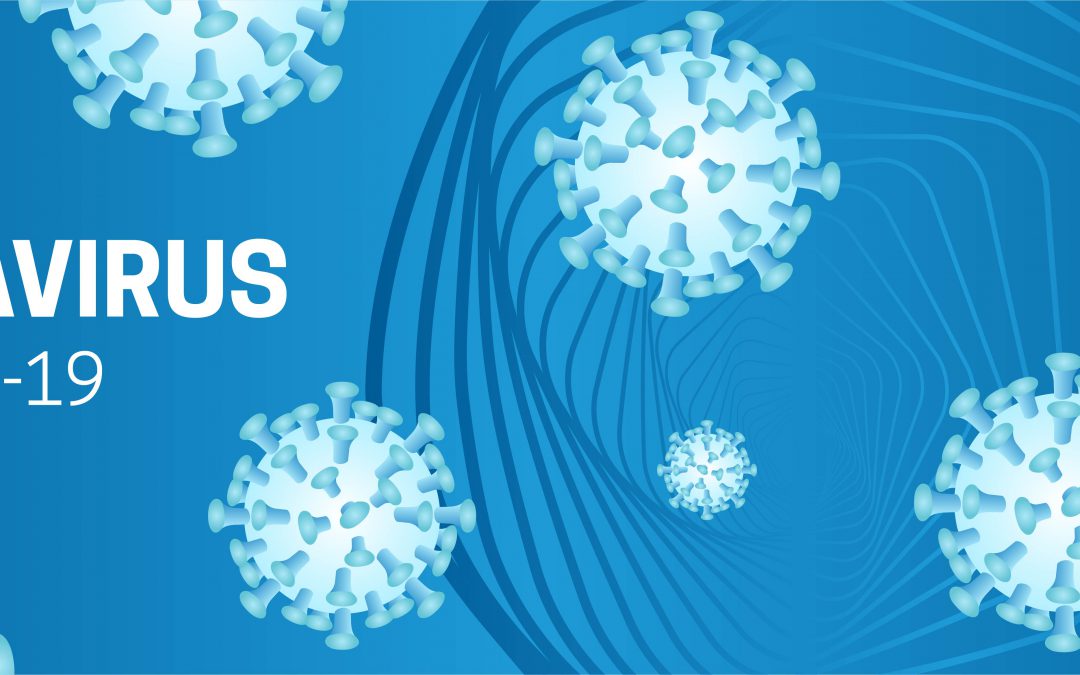
by Julie McConnell | Apr 2, 2020
Following the issuance of the Governor’s Executive Order 20-91 we have had a lot of questions from the Green Industry concerned about their status as essential employees. As noted in the excerpt below from the State of Florida Office of the Governor Executive Order Number 20-91 (Essential Services and Activities During COVID-19 Emergency) landscapers are included under the Public Works and Infrastructure Support Services Category.
PUBLIC WORKS AND INFRASTRUCTURE SUPPORT SERVICES
-
Workers who support the operation, inspection, and maintenance of essential public works facilities and operations, including bridges, water and sewer main breaks, fleet maintenance personnel, construction of critical or strategic infrastructure, traffic signal maintenance, emergency location services for buried utilities, maintenance of digital systems infrastructure supporting public works operations, and other emergent issues.
-
Workers such as plumbers, electricians, exterminators, builders, contractors, HVAC Technicians, landscapers, and other service providers who provide services that are necessary to maintaining the safety, sanitation, and essential operation of residences, businesses and buildings such as hospitals, senior living facilities, any temporary construction required to support COVID-19 response.
-
Workers who support, such as road and line clearing, to ensure the availability of and access to needed facilities, transportation, energy and communications.
-
Support to ensure the effective removal, storage, and disposal of residential and commercial solid waste and hazardous waste, including landfill operations.
-
Workers who support the operation, inspection, and maintenance of essential dams, locks and levees.
-
Workers who support the inspection and maintenance of aids to navigation, and other government provided services that ensure continued maritime commerce.
Florida Department of Agriculture and Consumer Services (FDACS) recommends that all essential employees carry a letter from their employer that describes their role as an essential employee.The Governor’s Office has provided a template that can be found at the following link. Download and modify to fit your business role. http://blogs.ifas.ufl.edu/nfrecsv/files/2020/03/2020-04-01-Essential-Worker-Movement-Letter-DRAFT-2.0-2.pdf
Please be mindful that although the landscape industry can continue working, it is imperative that all citizens follow CDC recommendations to prevent the spread of COVID-19. These can be found here https://www.cdc.gov/coronavirus/2019-ncov/prevent-getting-sick/prevention.html
In addition to this resource, consider incorporating recommendations from The Urban Ag Council of Georgia where appropriate.
*Stagger start times so that each manager will only work with their team. No more than 5-person crew.
* Employees are required to keep 8-foot separation between colleagues and/or any other people. Focus on social and work distancing.
*No more than 2 people per single cab truck and 4 people per crew cab truck (exceptions are made for employees who need to use personal vehicles to accomplish this).
*Wear dust masks when in vehicle and outside.
*Trucks are to be thoroughly cleaned at the end of every day.
*Crew leaders must clock in their crew. Do not pass phone around for them to clock-in.
*Daily – every employee (office and field) is screened with questions before starting work.
- Do you currently have a fever? Or have you had a fever in the last week?
- Do you have a cough?
- Do you have shortness of breath?
- Do you have vomiting/nausea?
- Do you have diarrhea or stomach issues?
- Have you been in contact with anyone with a confirmed or suspected case of the COVID-19?
Any employee that answers yes to any question will be asked to return home and HR will be notified to receive additional instructions.
Please be safe and let us know if we can assist in any way.
Your UF/IFAS Panhandle Commercial Horticulture Team
Bay – Julie McConnell juliebmcconnell@ufl.edu
Escambia – Beth Bolles bbolles@ufl.edu
Okaloosa – Sheila Dunning sdunning@ufl.edu
Santa Rosa – Matt Lollar mlollar@ufl.edu
Walton – Evan Anderson eanderson350@ufl.edu
Washington – Matt Orwat mjorwat@ufl.edu
Calhoun – Daniel Leonard d.leonard@ufl.edu
Leon – Mark Tancig tancig00@ufl.edu

by Matt Lollar | May 3, 2019
Are you looking for more selective herbicide options for annual beds and around shrubs and trees? The Santa Rosa County Extension Office will be hosting guest speaker Dr. Chris Marble from the UF/IFAS Mid-Florida Research & Education Center on Thursday, May 23. Dr. Marble is a Nationally Renowned Weed Scientist who has published numerous research and extension publications.
2 FDACS CEUs available in LCLM, Limited Lawn & Ornamental, Commercial L&O, O&T, Natural Areas, ROW, or Private Ag.
Pre-registration fee is $15, or $20 registration at the door the day of the event (includes lunch and resources). Pre-register online at Eventbrite Ticket or bring cash, check, or money order to the Santa Rosa County Extension Office, 6263 Dogwood Dr., Milton, FL before May 23. For additional questions, please contact Matt Lollar at mlollar@ufl.edu or 850-623-3868.
SCHEDULE
9:30 Registration & Welcome
9:45 Presentation Begins
11:30 Question & Answer w/Dr. Marble
11:45 Evaluation & CEUs
12:00 Lunch & Discussion on Glyphosate Registration
12:30 Adjourn
by Sheila Dunning | Jul 12, 2018
As of January 2015 the labels on fertilizer bags have changed. Florida Rule 5E-1.003 required fertilizer manufacturers to modify their package recommendations and wording.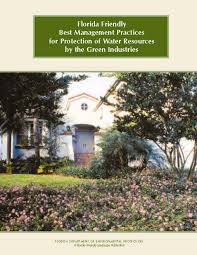
“Specialty fertilizers” was one of the more significant changes. This included packages that weigh 49 pounds or less and are labeled for home (residential) lawn use. The new labeling requirement for fertilizers labeled for use on urban lawns included that these products must be no phosphate or low phosphate. “No phosphate” fertilizers will be expressed as zero in the guaranteed analysis. “Low phosphate” fertilizers typically have 2% when labeled for residential lawns. Additionally, the recommended application rate must not exceed 0.25 lbs. P2O5 / 1,000 square feet per application and cannot exceed 0.50 lbs. P2O5 / 1,000 square feet per year. The only exception is “starter fertilizers”, which is a fertilizer formulated for a one-time application at planting or near that time to encourage root growth. A starter fertilizer can recommend a one-time application rate of 1.0 lb. of P2O5 / 1,000 square feet.
The Label is the Law
Application rates cannot be exceeded and the site must be on the label. The “site” refers to the specific grass area that the application is intended for. So, for fertilizer packaging under Rule SE-1.003 there a few definitions you need to understand:
- “Urban Turf” or “Lawns” means non-agricultural land planted in closely mowed, managed grasses except golf courses, parks and athletic fields.
- “New Urban Turf” means residential lawns established less than 12 months.
- “Actively Growing Turf” means turf that needs mowing at least once every two weeks to maintain the grass blade height according to the UF/IFAS recommendation.
- “Established Urban Turf” means residential lawns older than 12 months.
In addition to restrictions on phosphate, the Urban Turf Rule restricts the use of nitrogen. The amount that can be applied at once, as well as, annually and the seasonal application timing are defined based on the different regions of Florida. Local ordinances may be even more restrictive than the fertilizer label.
The following language must appear on all fertilizers sold at retail:
- “Apply only to actively growing turf”.
- “Do not apply near water, storm drains or drainage ditches”.
- “Do not apply if heavy rain is expected”.
- Apply this product only to your lawn and sweep any product that lands in the driveway, sidewalk or street back onto your lawn.
Finally, the labeling requirements for fertilizers that come in 50 pound bags or larger include that the directions for use cannot exceed rates recommended in the document entitled “Florida Friendly Best Management Practices for Protection of Water Resources by the Green Industries” (GI-BMP). The GI-BMP restricts nitrogen applications to less than what the label states. If the slow-release component of the overall nitrogen percentages is 30% or greater, the product can be applied at 1.0 lb. of N / 1,000 sq. ft. If it is less than 30%, then the rate is only 0.50 lb. N / 1,000 sq. ft.
The next time you are shopping for fertilizer, take the time to read the bag. Know that you are applying it correctly and legally.
By the way, if you are being compensated for applying fertilizer, FDACS requires a Limited Urban Commercial Fertilizer application certification with a pre-requisite of GI-BMP training.
Upcoming classes in Northwest Florida
Statewide GI-BMP classes
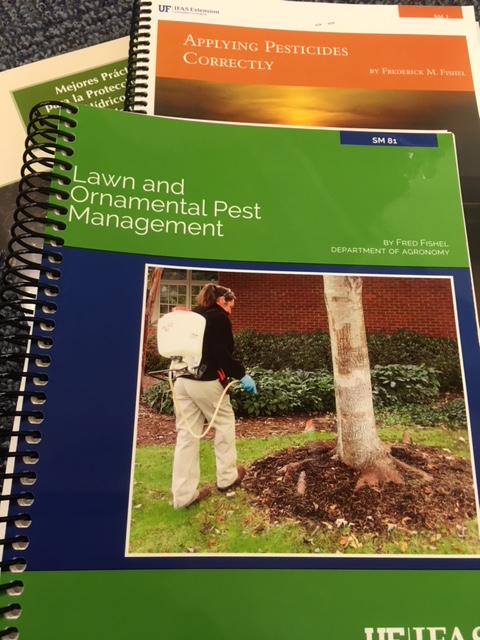
by Julie McConnell | Apr 10, 2018
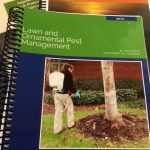 In December of 2017, a new Commercial Lawn & Ornamental Pest Control Operator exam was launched in Florida. This updated exam covers materials found in two new manuals not previously recommended as study guides: “Identification Guide to Common Florida Lawn and Ornamental Weeds,” and “Lawn and Ornamental Pest Management.”. Photographic pest identification including knowledge of life cycle have nearly tripled when compared to the prior exam.
In December of 2017, a new Commercial Lawn & Ornamental Pest Control Operator exam was launched in Florida. This updated exam covers materials found in two new manuals not previously recommended as study guides: “Identification Guide to Common Florida Lawn and Ornamental Weeds,” and “Lawn and Ornamental Pest Management.”. Photographic pest identification including knowledge of life cycle have nearly tripled when compared to the prior exam.
Because this exam is a statewide license, many pests may not be familiar to industry professionals in NW Florida if they are more commonly found in peninsular or South Florida.
The new exam also includes Green Industries Best Management Practices (GI-BMP) topics, Florida Statutes, Administrative Rules, safety concepts from “Applying Pesticides Correctly” and label reading – both fertilizer and pesticide calculations and label interpretation.
The paper exam has been offered twice in Apopka since the launch last year with pass rates below 50% at both sessions.
Panhandle Horticulture Agents in partnership with FDACS (Florida Department of Agriculture and Consumer Services) will be holding a review class May 10-11, 2018, in Panama City. This class is designed to reinforce lawn and ornamental pest control concepts with a focus on newly introduced material for the CPO Commercial Lawn & Ornamental exam, but is not a replacement for independent study.
Exams will not be given in conjunction with this class. Anyone interested in taking the CPO Commercial Lawn & Ornamental exam is still required to meet all mandated qualifications of education and/or experience. Applicants must then apply online https://aesecomm.freshfromflorida.com/ with FDACS to obtain a voucher and schedule the test with a local Extension office.
This class will also provide CEUs for current license holders in the following categories (please check 2018 CEU Commercial L&O Flyer for dates – not all CEUs available both days): Commercial L&O, Limited L&O, LCLM, O&T, Private Ag, Limited Urban Fertilizer. Core CEUs will be available both days.
Registration is customized based on attendees needs as one-day of your choice or two-day. If you plan to take the Comm. L&O Exam, it is strongly encouraged that you attend both days.
For questions about the class, please contact Julie McConnell at juliebmcconnell@ufl.edu
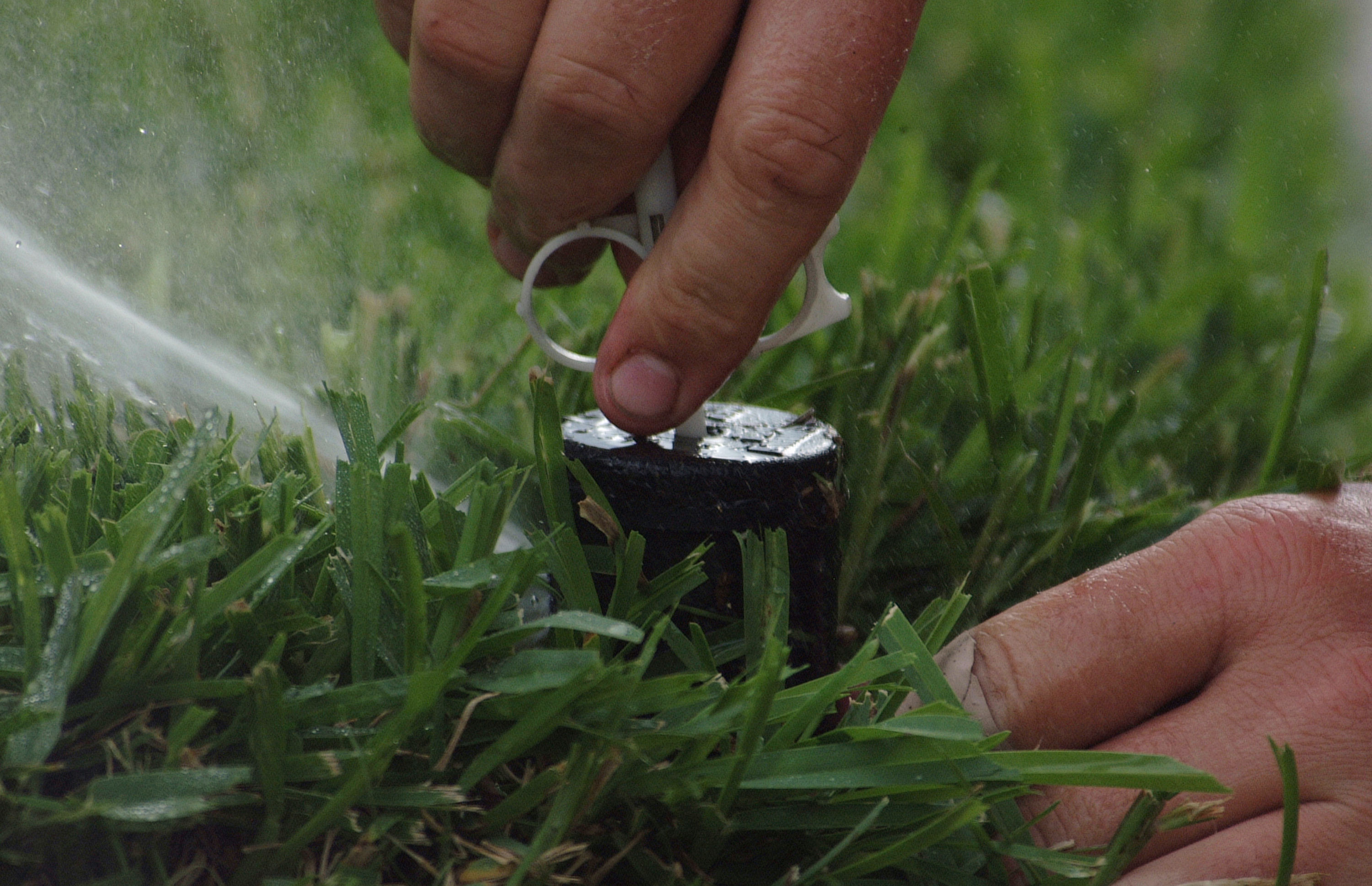
by Sheila Dunning | Apr 5, 2018
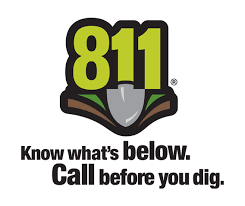 This month, recognized by the Senate and Florida’s governor, reminds diggers why calling 811 before all outdoor digging projects is important to your safety. Before installing a mailbox, fence, deck, garden or tree make sure to call Sunshine 811 to have underground lines marked. 811 is the free national number designated by the Federal Communications Commission. It notifies utility companies, who in turn send their professional locators to identify and mark the appropriate location of underground line with paint and flags in colors that identify the utility type. The following colors represent the seven various utilities: red, orange, blue, green, yellow, purple and white. To see which colors correspond with each utility click on the picture below:
This month, recognized by the Senate and Florida’s governor, reminds diggers why calling 811 before all outdoor digging projects is important to your safety. Before installing a mailbox, fence, deck, garden or tree make sure to call Sunshine 811 to have underground lines marked. 811 is the free national number designated by the Federal Communications Commission. It notifies utility companies, who in turn send their professional locators to identify and mark the appropriate location of underground line with paint and flags in colors that identify the utility type. The following colors represent the seven various utilities: red, orange, blue, green, yellow, purple and white. To see which colors correspond with each utility click on the picture below:
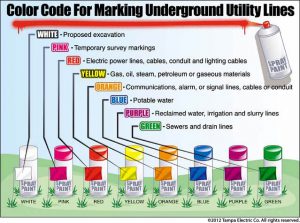
Hitting an underground utility line while digging can cause injuries, utility service outages to an entire neighborhood and damage to the environment. Failure to call before digging results in one unintentional utility hit every eight minutes nationwide. You could also be financially affected with costly fines and high repair costs.
Calling 811 in Florida is the law. At least two full business days before digging, do-it yourselfers and professional excavators must contact 811 by phone to start the process of getting underground utility lines marked. This is a free service. Be sure that all utilities have been marked before grabbing the shovel. Follow up on your one call ticket by contacting 811 again on the third day. For more information on Florida’s law, visit www.Sunshine811.com.







